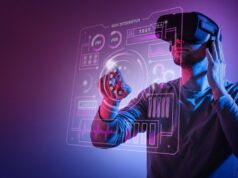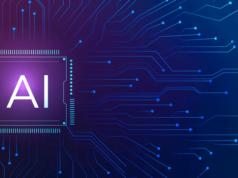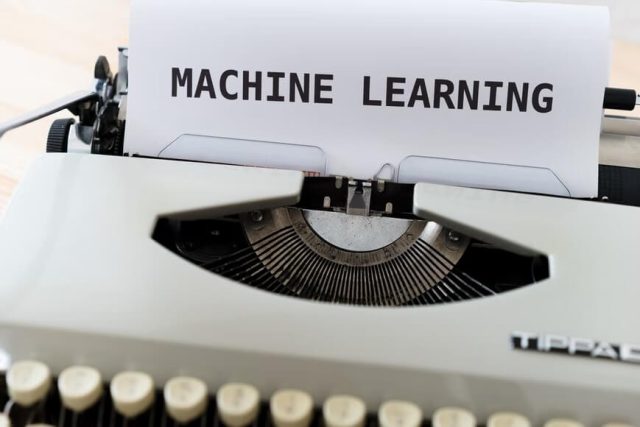
Machine Learning For Beginners: Types of Machine learning with interesting Examples
Four Types of Machine Learning.
- Supervised Learning
- Unsupervised Learning
- Semi-Supervised Learning
- Reinforcement Learning
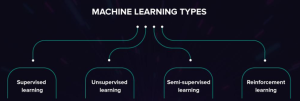
Before understanding the supervised learning type of machine learning I’ll give u an example to understand easily.
EXAMPLE NO 1:
The problem of Apple and Mango:
Suppose, we have 100 mangoes and 100 apples. We want a child to understand the apples and mangoes. For both apples and mangoes, we use two properties namely shape (Round (Apples), Oval (Mango)) and color (Red (Apple) and Yellow (Mango)). We divide these apples and mangoes into two parts i.e. training part and the testing part. The training samples are 140 (70 apples and 70 mangoes). Testing samples are 60 (30 apples and 30 mangoes).
During the training phase, we pick up an apple or mango. We ask the child two properties i.e. shape and color of the fruit and its name.
The child repeats behind us the properties and the name of the fruit. During training, sometimes he makes mistakes in naming the fruit. After showing him all the 140 samples of training, we start with testing the child. During testing, we pick up an apple or mango. We tell the child two properties of the fruits. Then we ask him to name the fruit. During training and testing, sometimes he makes mistakes in naming the fruit.
The training accuracy is the number of times he takes the correct names of the fruit during the training phase. The testing accuracy is the number of times he takes the correct names of the fruit during the testing phase.
Here I give you 2 concepts. Training and testing accuracy. Let’s begin with the types of machine learning.
Supervised Learning:
Supervised learning is the machine learning task for representing (mapping) input to an output. The supervised learning consists of three phases
- Training Phase
- Testing Phase
- Validation Phase
Training Phase: In this technique, we train an algorithm or technique by examples. The examples consist of two parts – input variables (Properties, independent variables), Output variables (Dependent variables). During training the algorithm, we provide both the input variables’ values and the related output variables’ values. This process is known as the training phase of the technique.
Testing Phase: After adequate training of the technique, another process starts which is called the testing phase of the technique. During the testing phase, we only provide the input or independent variables’ values to the algorithm. Based on learning during the training phase, the algorithm computes the output value of the dependent variable.
Validation Phase: Another related term called validation phase is also applied which is a part of testing the training direction. Like the testing phase, in the validation phase, we only provide the input variables’ values. The output variable values are calculated by the algorithm.
Before Understanding the Unsupervised Learning type of machine learning I’ll give you another example.
EXAMPLE NO 2:
The problem of Apple and mango identification. Suppose, we have 100 mangoes and 100 apples. We want a child to identify the apples and mangoes by himself.
For both apples and mangoes, we use two properties namely shape (Round (Apples), Oval (Mango)) and color (Red (Apple) and Yellow (Mango)).
We don’t divide these apples and mangoes into two parts i.e. training part and the testing part
The process works as:
We pick up an apple or mango.
We show (Not tell) the child two properties i.e. shape and color of the fruit (Without the name of the fruit).
The child thinks and decides on a name say X for the first fruit item.
We pick another apple or mango.
Show its properties to the child.
The child thinks and decides whether this new fruit is like X or different.
If it is like X, give the name X otherwise new name say Y.
We pick another apple or mango.
Show its properties to the child.
The child thinks and decides whether this new fruit is like X, Y, or different.
The process repeats until the whole data is divided into groups.
Unsupervised Learning:
Unsupervised learning is a collection of different types of machine learning algorithms. Simply, Unsupervised learning is where you only have input data (X) and no corresponding output variables (Y). Used to draw inferences from datasets consisting of input data without labeled responses. These are called unsupervised learning because unlike supervised learning above there are no correct answers for the data. There is no training and testing of the algorithms.
Semi-Supervised Learning:
Semi-supervised machine learning is a combination of supervised and unsupervised machine learning methods. In semi-supervised learning, an algorithm learns from a dataset that includes both labeled and unlabeled data, usually mostly unlabeled.
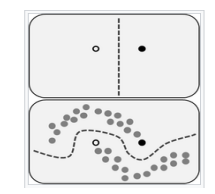 An example of the influence of unlabeled data in semi-supervised learning. The top panel shows a decision boundary we might adopt after seeing only one positive (white circle) and one negative (black circle) example. The bottom panel shows a decision boundary we might adopt if, in addition to the two labeled examples, we were given a collection of unlabeled data (gray circles).
An example of the influence of unlabeled data in semi-supervised learning. The top panel shows a decision boundary we might adopt after seeing only one positive (white circle) and one negative (black circle) example. The bottom panel shows a decision boundary we might adopt if, in addition to the two labeled examples, we were given a collection of unlabeled data (gray circles).
Reinforcement learning:
In reinforcement learning, the system continuously observes the external environment and responds accordingly. A very complicated type of learning because of observing the whole environment continuously. The goals of the system are first set and then actions are taken. The system learns exclusively from a series of reinforcements (Supports). Those can be positive or negative in relation to a system goal. Positive ones are known as “rewards” while on the other hand, we’ll call the negative ones “punishments”.
EXAMPLE NO 3:
Let’s take a model playing a video game. The system gets a reward when it wins more points. But then, if it loses, the model will receive a punishment. As a result, the model can then identify what moves were good in terms of strategy.
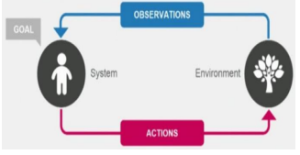
Note: In my next blogs will discuss briefly the types of machine learning i-e In supervised learning discuss classification and regression, In Unsupervised learning discuss the labeled and unlabeled data, clustering, etc.


